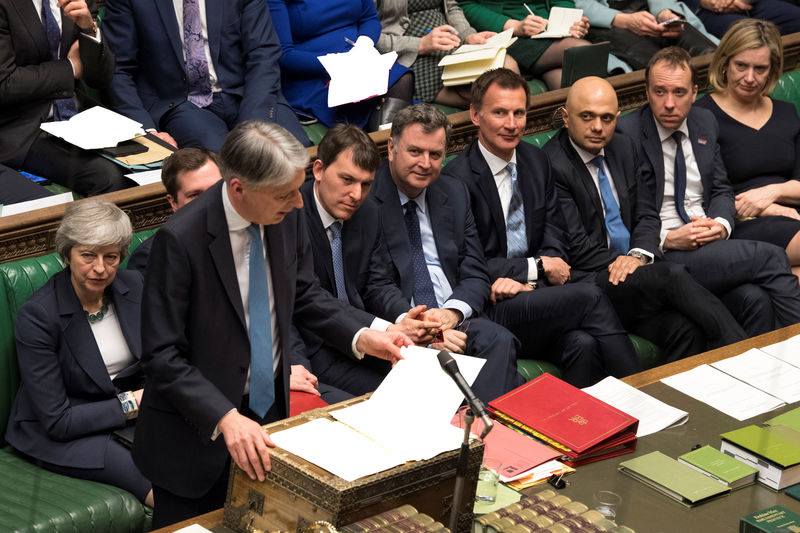By William James and Kylie MacLellan
LONDON (Reuters) - British lawmakers were on Wednesday set to vote against the threat of a 'no-deal' exit from the European Union on March 29 after a second defeat for Prime Minister Theresa May's divorce agreement left Britain heading into the unknown.
After two-and-a-half years of negotiations and two failed attempts to pass her deal, parliament is now expected to reject a no-deal exit, which investors fear would spook financial markets, dislocate supply chains and damage the world's fifth largest economy.
Lawmakers will vote shortly after 1900 GMT on a government motion stating that parliament rejects leaving the EU without a deal on March 29 - but notes that leaving without a deal remains the legal default unless a deal is agreed, allowing for it to happen at a later date.
Environment Secretary Michael Gove, standing in for May after she lost her voice in earlier debates, told parliament that tens of thousands of businesses were not prepared for a no-deal exit.
While Wednesday's motion has no legal force and ultimately does not prevent a no-deal exit, if lawmakers support it as expected then they will get a vote on Thursday on whether to ask the EU to delay Brexit, probably by months.
Finance minister Philip Hammond said he could free billions of pounds for extra public spending or tax cuts if parliament spared Britain the shock of leaving the world's biggest trading bloc without an agreement to smooth the transition.
"Leaving with no deal would mean significant disruption in the short and medium term, and a smaller, less prosperous economy in the long term, than if we leave with a deal," Hammond told lawmakers.
"WE HAVE A GOOD DEAL"
Ahead of Wednesday's vote, the pound headed for its biggest daily rise in 2019 as investors bet that parliament would resoundingly vote against a no-deal Brexit.
After lawmakers crushed her deal for a second time on Tuesday, May said it was still the best option for leaving in an orderly fashion.
"I want to leave the European Union with a good deal, I believe we have a good deal," she told parliament. May said the government would not instruct her Conservative Party's lawmakers how to vote on its motion.
But it did forbid them to back a proposed cross-party amendment to the motion that sought to rule out a no-deal exit under any circumstances, leading to the amendment being withdrawn.
A remaining amendment calls on the government to delay Brexit until May 22 to give it time to put in place measures to mitigate the consequences of leaving the EU without a deal.
Meanwhile, a reporter for the Financial Times said two senior lawmakers were planning to ask parliament to allow votes on what alternative forms of Brexit might be acceptable, which could pave the way for a diluted departure deal.
As the United Kingdom's three-year Brexit crisis spins toward its finale, diplomats and investors see four main options: a delay, May's deal passing at the last minute, an accidental no-deal exit or another referendum.
Northern Ireland's Democratic Unionist Party, which props up May's government, said her Brexit deal was "dead" and should not be put to parliament for a third time.
"We have not given up the goal of an orderly exit," German Chancellor Angela Merkel said, "but yesterday's events mean the options have become narrower."
DELAY UNTIL WHEN?
If Britain does seek a delay, it would require the agreement of all the bloc's other 27 members.
The EU would prefer a short extension, with the deadline of EU-wide parliamentary elections due May 24-26, although it is unclear that this would be long to solve the impasse in London.
EU Brexit negotiator Michel Barnier said the bloc would need to know why Britain wanted to extend talks and that it was up to London to find a way out of the deadlock. The EU said there could be no more negotiations on the divorce terms.
As Brexit uncertainty spills into foreign exchange, stock and bond markets across the world, investment banks such as Goldman Sachs (NYSE:GS) and JPMorgan (NYSE:JPM) are offering different probabilities on the outcomes.
"We continue to see a 55 percent chance that a close variant of the prime minister’s Brexit deal is eventually ratified, after a three-month extension of Article 50," Goldman said. It gave a reversal of Brexit a 35 percent probability and a no-deal Brexit 10 percent.
Britons voted by 52-48 percent in 2016 to leave the bloc, a decision that has split the main political parties and exposed deep rifts in British society.
May's deal covers such things as citizens' rights, the status of the Irish border and Britain's divorce bill from the EU. It takes Britain out of the EU single market and customs union, common fisheries and farm policies and the jurisdiction of the European Court of Justice. It also offers a status-quo transition period in which to negotiate trade arrangements.

Under a no-deal exit, there would be no transition period to soften the disruption to trade and regulations. Britain would quit the EU's 510 million-strong single market and customs union and fall back on World Trade Organisation rules, which could mean tariffs on many imports and exports.